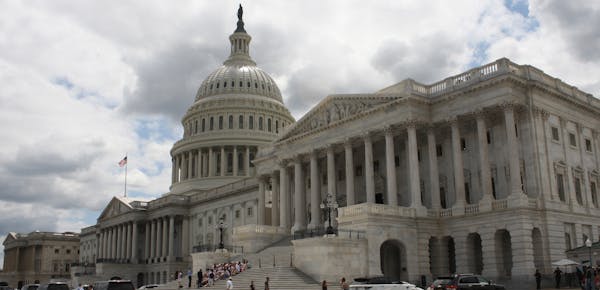With a seat in Congress and federal money hanging in the balance, Gov. Tim Walz and Lt. Gov. Peggy Flanagan kicked off a yearlong effort Monday to ensure that every Minnesotan is counted in the 2020 census.
"The ability to have a fair democracy is incumbent on every single person being counted," Walz said at a rally in the Capitol rotunda. "Once the census is done and we start to use that data … we can provide better services to improve people's lives."
At stake is about $15 billion a year in federal funding that is apportioned by population. Although Minnesota's population is growing, the state is at risk of losing one of its eight U.S. House seats because other states, particularly in the Sun Belt, are growing faster. That would dilute the state's influence on Capitol Hill.
The state also would forfeit one of its 10 Electoral College votes. Each state's allotment of the 538 electors equals the number of its House members plus its two U.S. senators.
Walz' budget proposes spending $1.6 million on census efforts; a measure pending in the Legislature would up the amount to $2.5 million.
State Rep. Jamie Long said that the bill he introduced with fellow Minneapolis Democrat Rep. Fue Lee has seven Republican cosponsors.
Flanagan said that an undercount of a single person could result in the loss of $28,000 in federal funds over a decade. The money goes to roads, schools, hospitals, senior centers, emergency services and many other social programs.
"The census is a key element of helping rural communities be strong. We need to know who's there," said Allison Ahcan of the Blandin Foundation.
For months, counties and cities and community groups have been organizing Complete Count Committees to help spread the word.
"We need to get the public educated, engaged and committed to being a part of the census in 2020," said Marilyn A. Sanders, the Chicago-based regional director of the U.S. Census Bureau.
She attended Monday's rally and said in an interview that a broad public-relations campaign will begin in November to raise awareness via TV ads and social media. "If people know the importance of the census, we believe that they will participate," she said.
There's concern that some people in minority communities will be reluctant to fill out census forms because President Donald Trump's administration wants to add a question about citizenship status.
Mark Felton is chairman of Edina's Complete Count Committee. "The main reason I'm on the committee is to try to alleviate fears — fears in what I call the hard-to-count community," he said. "I'm an African-American, and I want to make sure that the census does not hurt those that complete it."
In a tweet Monday, Trump blamed "Radical Democrats" for trying to remove what he called "the all important Citizenship Question." He said the results "would be meaningless and a waste of the $Billions (ridiculous) that it costs to put together!"
The U.S. Supreme Court has agreed to decide on the controversial citizenship question; a hearing is set for April 23.
Xiongpao Lee of the Hmong Census Network urged the state's 70,000 Hmong residents to participate. "Don't let anybody scare you away. … Fill out that form," said Lee, a member of the statewide Complete Count Committee.
Meanwhile, Minnesota Attorney General Keith Ellison's office said he has joined a coalition of 18 states, 16 local governments, and the U.S. Conference of Mayors in filing a brief at the U.S. Supreme Court that challenges the U.S. Department of Commerce's efforts to add a question about citizenship to the 2020 Census.
Judy Keen • 612-673-4234
Former DFL Senate Majority Leader Kari Dziedzic dies of cancer at age 62

How the Star Tribune is covering the 2024 election

Fact check: Walz and Vance made questionable claims during only VP debate

In Tim Walz's home city, opposing groups watch him debate on the national stage

